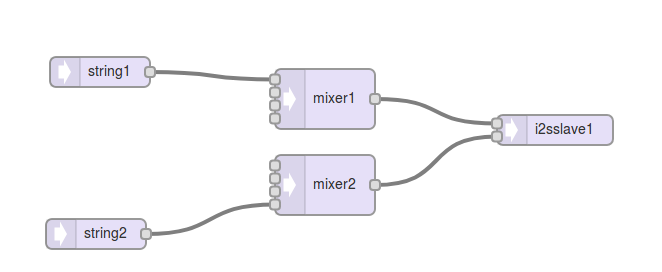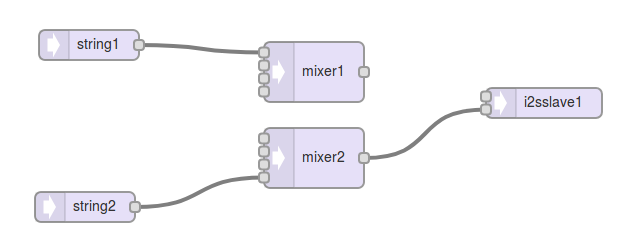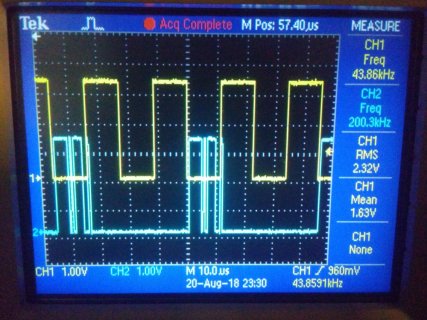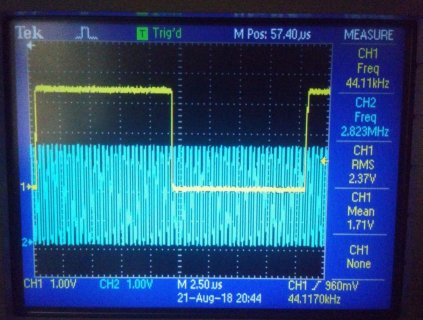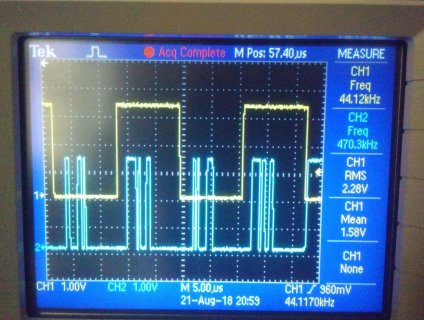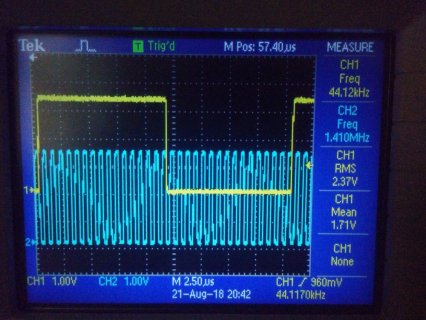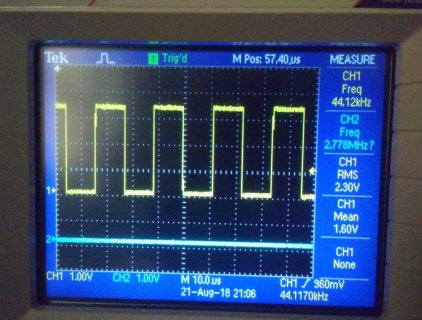/* Audio Library for Teensy 3.X
* Copyright (c) 2014, Paul Stoffregen, paul@pjrc.com
*
* Development of this audio library was funded by PJRC.COM, LLC by sales of
* Teensy and Audio Adaptor boards. Please support PJRC's efforts to develop
* open source software by purchasing Teensy or other PJRC products.
*
* Permission is hereby granted, free of charge, to any person obtaining a copy
* of this software and associated documentation files (the "Software"), to deal
* in the Software without restriction, including without limitation the rights
* to use, copy, modify, merge, publish, distribute, sublicense, and/or sell
* copies of the Software, and to permit persons to whom the Software is
* furnished to do so, subject to the following conditions:
*
* The above copyright notice, development funding notice, and this permission
* notice shall be included in all copies or substantial portions of the Software.
*
* THE SOFTWARE IS PROVIDED "AS IS", WITHOUT WARRANTY OF ANY KIND, EXPRESS OR
* IMPLIED, INCLUDING BUT NOT LIMITED TO THE WARRANTIES OF MERCHANTABILITY,
* FITNESS FOR A PARTICULAR PURPOSE AND NONINFRINGEMENT. IN NO EVENT SHALL THE
* AUTHORS OR COPYRIGHT HOLDERS BE LIABLE FOR ANY CLAIM, DAMAGES OR OTHER
* LIABILITY, WHETHER IN AN ACTION OF CONTRACT, TORT OR OTHERWISE, ARISING FROM,
* OUT OF OR IN CONNECTION WITH THE SOFTWARE OR THE USE OR OTHER DEALINGS IN
* THE SOFTWARE.
*/
#include <Arduino.h>
#include "output_i2s.h"
#include "memcpy_audio.h"
audio_block_t * AudioOutputI2S::block_left_1st = NULL;
audio_block_t * AudioOutputI2S::block_right_1st = NULL;
audio_block_t * AudioOutputI2S::block_left_2nd = NULL;
audio_block_t * AudioOutputI2S::block_right_2nd = NULL;
uint16_t AudioOutputI2S::block_left_offset = 0;
uint16_t AudioOutputI2S::block_right_offset = 0;
bool AudioOutputI2S::update_responsibility = false;
DMAMEM static uint32_t i2s_tx_buffer[AUDIO_BLOCK_SAMPLES];
DMAChannel AudioOutputI2S::dma(false);
void AudioOutputI2S::begin(void)
{
dma.begin(true); // Allocate the DMA channel first
block_left_1st = NULL;
block_right_1st = NULL;
// TODO: should we set & clear the I2S_TCSR_SR bit here?
config_i2s();
CORE_PIN22_CONFIG = PORT_PCR_MUX(6); // pin 22, PTC1, I2S0_TXD0
#if defined(KINETISK)
dma.TCD->SADDR = i2s_tx_buffer;
dma.TCD->SOFF = 2;
dma.TCD->ATTR = DMA_TCD_ATTR_SSIZE(1) | DMA_TCD_ATTR_DSIZE(1);
dma.TCD->NBYTES_MLNO = 2;
dma.TCD->SLAST = -sizeof(i2s_tx_buffer);
dma.TCD->DADDR = (void *)((uint32_t)&I2S0_TDR0 + 2);
dma.TCD->DOFF = 0;
dma.TCD->CITER_ELINKNO = sizeof(i2s_tx_buffer) / 2;
dma.TCD->DLASTSGA = 0;
dma.TCD->BITER_ELINKNO = sizeof(i2s_tx_buffer) / 2;
dma.TCD->CSR = DMA_TCD_CSR_INTHALF | DMA_TCD_CSR_INTMAJOR;
#endif
dma.triggerAtHardwareEvent(DMAMUX_SOURCE_I2S0_TX);
update_responsibility = update_setup();
dma.enable();
I2S0_TCSR = I2S_TCSR_SR;
I2S0_TCSR = I2S_TCSR_TE | I2S_TCSR_BCE | I2S_TCSR_FRDE;
dma.attachInterrupt(isr);
}
void AudioOutputI2S::isr(void)
{
#if defined(KINETISK)
int16_t *dest;
audio_block_t *blockL, *blockR;
uint32_t saddr, offsetL, offsetR;
saddr = (uint32_t)(dma.TCD->SADDR);
dma.clearInterrupt();
if (saddr < (uint32_t)i2s_tx_buffer + sizeof(i2s_tx_buffer) / 2) {
// DMA is transmitting the first half of the buffer
// so we must fill the second half
dest = (int16_t *)&i2s_tx_buffer[AUDIO_BLOCK_SAMPLES/2];
if (AudioOutputI2S::update_responsibility) AudioStream::update_all();
} else {
// DMA is transmitting the second half of the buffer
// so we must fill the first half
dest = (int16_t *)i2s_tx_buffer;
}
blockL = AudioOutputI2S::block_left_1st;
blockR = AudioOutputI2S::block_right_1st;
offsetL = AudioOutputI2S::block_left_offset;
offsetR = AudioOutputI2S::block_right_offset;
if (blockL && blockR) {
memcpy_tointerleaveLR(dest, blockL->data + offsetL, blockR->data + offsetR);
offsetL += AUDIO_BLOCK_SAMPLES / 2;
offsetR += AUDIO_BLOCK_SAMPLES / 2;
} else if (blockL) {
memcpy_tointerleaveL(dest, blockL->data + offsetL);
offsetL += AUDIO_BLOCK_SAMPLES / 2;
} else if (blockR) {
memcpy_tointerleaveR(dest, blockR->data + offsetR);
offsetR += AUDIO_BLOCK_SAMPLES / 2;
} else {
memset(dest,0,AUDIO_BLOCK_SAMPLES * 2);
return;
}
if (offsetL < AUDIO_BLOCK_SAMPLES) {
AudioOutputI2S::block_left_offset = offsetL;
} else {
AudioOutputI2S::block_left_offset = 0;
AudioStream::release(blockL);
AudioOutputI2S::block_left_1st = AudioOutputI2S::block_left_2nd;
AudioOutputI2S::block_left_2nd = NULL;
}
if (offsetR < AUDIO_BLOCK_SAMPLES) {
AudioOutputI2S::block_right_offset = offsetR;
} else {
AudioOutputI2S::block_right_offset = 0;
AudioStream::release(blockR);
AudioOutputI2S::block_right_1st = AudioOutputI2S::block_right_2nd;
AudioOutputI2S::block_right_2nd = NULL;
}
#else
const int16_t *src, *end;
int16_t *dest;
audio_block_t *block;
uint32_t saddr, offset;
saddr = (uint32_t)(dma.CFG->SAR);
dma.clearInterrupt();
if (saddr < (uint32_t)i2s_tx_buffer + sizeof(i2s_tx_buffer) / 2) {
// DMA is transmitting the first half of the buffer
// so we must fill the second half
dest = (int16_t *)&i2s_tx_buffer[AUDIO_BLOCK_SAMPLES/2];
end = (int16_t *)&i2s_tx_buffer[AUDIO_BLOCK_SAMPLES];
if (AudioOutputI2S::update_responsibility) AudioStream::update_all();
} else {
// DMA is transmitting the second half of the buffer
// so we must fill the first half
dest = (int16_t *)i2s_tx_buffer;
end = (int16_t *)&i2s_tx_buffer[AUDIO_BLOCK_SAMPLES/2];
}
block = AudioOutputI2S::block_left_1st;
if (block) {
offset = AudioOutputI2S::block_left_offset;
src = &block->data[offset];
do {
*dest = *src++;
dest += 2;
} while (dest < end);
offset += AUDIO_BLOCK_SAMPLES/2;
if (offset < AUDIO_BLOCK_SAMPLES) {
AudioOutputI2S::block_left_offset = offset;
} else {
AudioOutputI2S::block_left_offset = 0;
AudioStream::release(block);
AudioOutputI2S::block_left_1st = AudioOutputI2S::block_left_2nd;
AudioOutputI2S::block_left_2nd = NULL;
}
} else {
do {
*dest = 0;
dest += 2;
} while (dest < end);
}
dest -= AUDIO_BLOCK_SAMPLES - 1;
block = AudioOutputI2S::block_right_1st;
if (block) {
offset = AudioOutputI2S::block_right_offset;
src = &block->data[offset];
do {
*dest = *src++;
dest += 2;
} while (dest < end);
offset += AUDIO_BLOCK_SAMPLES/2;
if (offset < AUDIO_BLOCK_SAMPLES) {
AudioOutputI2S::block_right_offset = offset;
} else {
AudioOutputI2S::block_right_offset = 0;
AudioStream::release(block);
AudioOutputI2S::block_right_1st = AudioOutputI2S::block_right_2nd;
AudioOutputI2S::block_right_2nd = NULL;
}
} else {
do {
*dest = 0;
dest += 2;
} while (dest < end);
}
#endif
}
void AudioOutputI2S::update(void)
{
// null audio device: discard all incoming data
//if (!active) return;
//audio_block_t *block = receiveReadOnly();
//if (block) release(block);
audio_block_t *block;
block = receiveReadOnly(0); // input 0 = left channel
if (block) {
__disable_irq();
if (block_left_1st == NULL) {
block_left_1st = block;
block_left_offset = 0;
__enable_irq();
} else if (block_left_2nd == NULL) {
block_left_2nd = block;
__enable_irq();
} else {
audio_block_t *tmp = block_left_1st;
block_left_1st = block_left_2nd;
block_left_2nd = block;
block_left_offset = 0;
__enable_irq();
release(tmp);
}
}
block = receiveReadOnly(1); // input 1 = right channel
if (block) {
__disable_irq();
if (block_right_1st == NULL) {
block_right_1st = block;
block_right_offset = 0;
__enable_irq();
} else if (block_right_2nd == NULL) {
block_right_2nd = block;
__enable_irq();
} else {
audio_block_t *tmp = block_right_1st;
block_right_1st = block_right_2nd;
block_right_2nd = block;
block_right_offset = 0;
__enable_irq();
release(tmp);
}
}
}
// MCLK needs to be 48e6 / 1088 * 256 = 11.29411765 MHz -> 44.117647 kHz sample rate
//
#if F_CPU == 96000000 || F_CPU == 48000000 || F_CPU == 24000000
// PLL is at 96 MHz in these modes
#define MCLK_MULT 2
#define MCLK_DIV 17
#elif F_CPU == 72000000
#define MCLK_MULT 8
#define MCLK_DIV 51
#elif F_CPU == 120000000
#define MCLK_MULT 8
#define MCLK_DIV 85
#elif F_CPU == 144000000
#define MCLK_MULT 4
#define MCLK_DIV 51
#elif F_CPU == 168000000
#define MCLK_MULT 8
#define MCLK_DIV 119
#elif F_CPU == 180000000
#define MCLK_MULT 16
#define MCLK_DIV 255
#define MCLK_SRC 0
#elif F_CPU == 192000000
#define MCLK_MULT 1
#define MCLK_DIV 17
#elif F_CPU == 216000000
#define MCLK_MULT 8
#define MCLK_DIV 153
#define MCLK_SRC 0
#elif F_CPU == 240000000
#define MCLK_MULT 4
#define MCLK_DIV 85
#elif F_CPU == 16000000
#define MCLK_MULT 12
#define MCLK_DIV 17
#else
#error "This CPU Clock Speed is not supported by the Audio library";
#endif
#ifndef MCLK_SRC
#if F_CPU >= 20000000
#define MCLK_SRC 3 // the PLL
#else
#define MCLK_SRC 0 // system clock
#endif
#endif
void AudioOutputI2S::config_i2s(void)
{
SIM_SCGC6 |= SIM_SCGC6_I2S;
SIM_SCGC7 |= SIM_SCGC7_DMA;
SIM_SCGC6 |= SIM_SCGC6_DMAMUX;
// if either transmitter or receiver is enabled, do nothing
if (I2S0_TCSR & I2S_TCSR_TE) return;
if (I2S0_RCSR & I2S_RCSR_RE) return;
// enable MCLK output
I2S0_MCR = I2S_MCR_MICS(MCLK_SRC) | I2S_MCR_MOE;
while (I2S0_MCR & I2S_MCR_DUF) ;
I2S0_MDR = I2S_MDR_FRACT((MCLK_MULT-1)) | I2S_MDR_DIVIDE((MCLK_DIV-1));
// configure transmitter
I2S0_TMR = 0;
I2S0_TCR1 = I2S_TCR1_TFW(1); // watermark at half fifo size
I2S0_TCR2 = I2S_TCR2_SYNC(0) | I2S_TCR2_BCP | I2S_TCR2_MSEL(1)
| I2S_TCR2_BCD | I2S_TCR2_DIV(I2S_BIT_CLOCK_DIV);
I2S0_TCR3 = I2S_TCR3_TCE;
I2S0_TCR4 = I2S_TCR4_FRSZ(1) | I2S_TCR4_SYWD(I2S_WORD_SIZE) | I2S_TCR4_MF
| I2S_TCR4_FSE | I2S_TCR4_FSP | I2S_TCR4_FSD;
I2S0_TCR5 = I2S_TCR5_WNW(I2S_WORD_SIZE) | I2S_TCR5_W0W(I2S_WORD_SIZE) | I2S_TCR5_FBT(I2S_WORD_SIZE);
// configure receiver (sync'd to transmitter clocks)
I2S0_RMR = 0;
I2S0_RCR1 = I2S_RCR1_RFW(1);
I2S0_RCR2 = I2S_RCR2_SYNC(1) | I2S_TCR2_BCP | I2S_RCR2_MSEL(1)
| I2S_RCR2_BCD | I2S_RCR2_DIV(I2S_BIT_CLOCK_DIV);
I2S0_RCR3 = I2S_RCR3_RCE;
I2S0_RCR4 = I2S_RCR4_FRSZ(1) | I2S_RCR4_SYWD(I2S_WORD_SIZE) | I2S_RCR4_MF
| I2S_RCR4_FSE | I2S_RCR4_FSP | I2S_RCR4_FSD;
I2S0_RCR5 = I2S_RCR5_WNW(I2S_WORD_SIZE) | I2S_RCR5_W0W(I2S_WORD_SIZE) | I2S_RCR5_FBT(I2S_WORD_SIZE);
// configure pin mux for 3 clock signals
CORE_PIN23_CONFIG = PORT_PCR_MUX(6); // pin 23, PTC2, I2S0_TX_FS (LRCLK)
CORE_PIN9_CONFIG = PORT_PCR_MUX(6); // pin 9, PTC3, I2S0_TX_BCLK
CORE_PIN11_CONFIG = PORT_PCR_MUX(6); // pin 11, PTC6, I2S0_MCLK
}
/******************************************************************/
void AudioOutputI2Sslave::begin(void)
{
dma.begin(true); // Allocate the DMA channel first
//pinMode(2, OUTPUT);
block_left_1st = NULL;
block_right_1st = NULL;
AudioOutputI2Sslave::config_i2s();
CORE_PIN22_CONFIG = PORT_PCR_MUX(6); // pin 22, PTC1, I2S0_TXD0
#if defined(KINETISK)
dma.TCD->SADDR = i2s_tx_buffer;
dma.TCD->SOFF = 2;
dma.TCD->ATTR = DMA_TCD_ATTR_SSIZE(1) | DMA_TCD_ATTR_DSIZE(1);
dma.TCD->NBYTES_MLNO = 2;
dma.TCD->SLAST = -sizeof(i2s_tx_buffer);
dma.TCD->DADDR = (void *)((uint32_t)&I2S0_TDR0 + 2);
// Macro to switch easily
#if I2S_WORD_SIZE == 15
// for 32 bit frames ??
//dma.TCD->DADDR = &I2S0_TDR0;
#else
//for 64 bit frames ??
//dma.TCD->DADDR = (void *)((uint32_t)&I2S0_TDR0 + 2);
#endif
dma.TCD->DOFF = 0;
dma.TCD->CITER_ELINKNO = sizeof(i2s_tx_buffer) / 2;
dma.TCD->DLASTSGA = 0;
dma.TCD->BITER_ELINKNO = sizeof(i2s_tx_buffer) / 2;
dma.TCD->CSR = DMA_TCD_CSR_INTHALF | DMA_TCD_CSR_INTMAJOR;
#endif
dma.triggerAtHardwareEvent(DMAMUX_SOURCE_I2S0_TX);
update_responsibility = update_setup();
dma.enable();
I2S0_TCSR = I2S_TCSR_SR;
I2S0_TCSR = I2S_TCSR_TE | I2S_TCSR_BCE | I2S_TCSR_FRDE;
dma.attachInterrupt(isr);
}
void AudioOutputI2Sslave::config_i2s(void)
{
SIM_SCGC6 |= SIM_SCGC6_I2S;
SIM_SCGC7 |= SIM_SCGC7_DMA;
SIM_SCGC6 |= SIM_SCGC6_DMAMUX;
// if either transmitter or receiver is enabled, do nothing
if (I2S0_TCSR & I2S_TCSR_TE) return;
if (I2S0_RCSR & I2S_RCSR_RE) return;
// Select input clock 0
// Configure to input the bit-clock from pin, bypasses the MCLK divider
I2S0_MCR = I2S_MCR_MICS(0);
I2S0_MDR = 0;
// configure transmitter
I2S0_TMR = 0;
I2S0_TCR1 = I2S_TCR1_TFW(1); // watermark at half fifo size
I2S0_TCR2 = I2S_TCR2_SYNC(0) | I2S_TCR2_BCP;
I2S0_TCR3 = I2S_TCR3_TCE;
I2S0_TCR4 = I2S_TCR4_FRSZ(1) | I2S_TCR4_SYWD(I2S_WORD_SIZE) | I2S_TCR4_MF
| I2S_TCR4_FSE | I2S_TCR4_FSP;
I2S0_TCR5 = I2S_TCR5_WNW(I2S_WORD_SIZE) | I2S_TCR5_W0W(I2S_WORD_SIZE) | I2S_TCR5_FBT(I2S_WORD_SIZE);
// configure receiver (sync'd to transmitter clocks)
I2S0_RMR = 0;
I2S0_RCR1 = I2S_RCR1_RFW(1);
I2S0_RCR2 = I2S_RCR2_SYNC(1) | I2S_TCR2_BCP;
I2S0_RCR3 = I2S_RCR3_RCE;
I2S0_RCR4 = I2S_RCR4_FRSZ(1) | I2S_RCR4_SYWD(I2S_WORD_SIZE) | I2S_RCR4_MF
| I2S_RCR4_FSE | I2S_RCR4_FSP | I2S_RCR4_FSD;
I2S0_RCR5 = I2S_RCR5_WNW(I2S_WORD_SIZE) | I2S_RCR5_W0W(I2S_WORD_SIZE) | I2S_RCR5_FBT(I2S_WORD_SIZE);
// configure pin mux for 3 clock signals
CORE_PIN23_CONFIG = PORT_PCR_MUX(6); // pin 23, PTC2, I2S0_TX_FS (LRCLK)
CORE_PIN9_CONFIG = PORT_PCR_MUX(6); // pin 9, PTC3, I2S0_TX_BCLK
CORE_PIN11_CONFIG = PORT_PCR_MUX(6); // pin 11, PTC6, I2S0_MCLK
}
